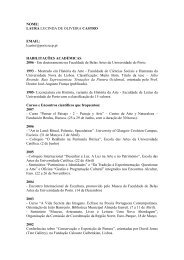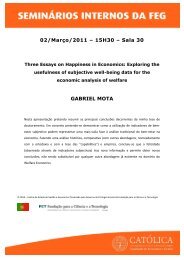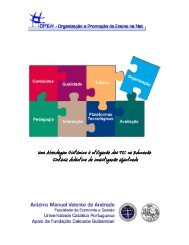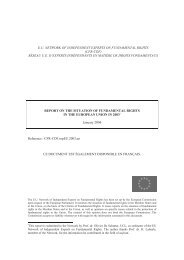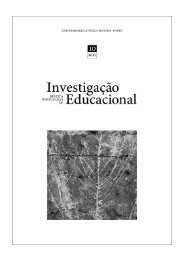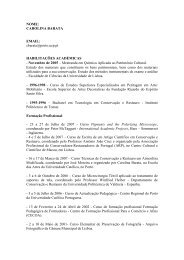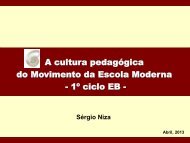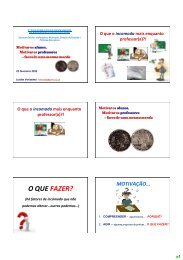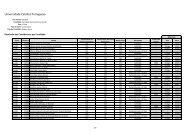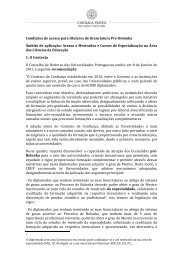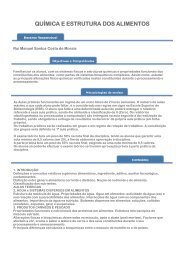History of Economic Thought - Faculdade de Economia e Gestão
History of Economic Thought - Faculdade de Economia e Gestão
History of Economic Thought - Faculdade de Economia e Gestão
Create successful ePaper yourself
Turn your PDF publications into a flip-book with our unique Google optimized e-Paper software.
Syllabus [Bibliography]1. IntroductionPART I – Preclassical <strong>Economic</strong>s2. Ancient and Medieval <strong>Economic</strong> <strong>Thought</strong>3. Mercantilism and PhisiocracyPART II Classical <strong>Economic</strong>s and its critics4. Adam Smith5. David Ricardo and Thomas Malthus6. Jeremy Bentham, Jean-Baptiste Say and Nassau Senior7. John Stuart Mill and the <strong>de</strong>cline <strong>of</strong> Classical <strong>Economic</strong>s8. Karl Marx and his critique to Classical <strong>Economic</strong>sPART III Neoclassical <strong>Economic</strong>s and its critics.9. Jevons, Menger and Walras and the emergence <strong>of</strong> Marginal Analysis10. The transiction to the Neoclassical <strong>Economic</strong>s11. Alfred Marshal and the Neoclassical <strong>Economic</strong>s12. Walras and the General Equilibrium Theory13. The Institutionalist and Historicist Critiques14. The Austrian Critique and the Debate on <strong>Economic</strong> SystemsPART IV – Mo<strong>de</strong>rn <strong>Economic</strong>s and its Critics15. Developments in Microeconomics16. Developments in Macroeconomics17. Developments in Econometrics and Empirical Methods for <strong>Economic</strong>s18. Developments in Heterodox <strong>Economic</strong> <strong>Thought</strong>Each lecture topic will be discussed during workshops. You can find information regarding mainbibliography, which is <strong>de</strong>scribed in <strong>de</strong>tail in Mandatory bibliography.<strong>History</strong> <strong>of</strong> <strong>Economic</strong> <strong>Thought</strong> 11/04/2012 2/6
Mandatory bibliographyLANDRETH, Harry; COLANDER, David (2002). <strong>History</strong> <strong>of</strong> <strong>Economic</strong> <strong>Thought</strong>. 4th Edition. HougthonMifflin.SANDELIN, Bo; TRAUTWEIN, Hans; WUNDRAK, Richard (2008). A Short <strong>History</strong> <strong>of</strong> <strong>Economic</strong> <strong>Thought</strong>.2nd Edition. Routledge.HOLLIS, Martin (2008). The Philosophy <strong>of</strong> Social Science: an introduction. Revised and Updated. CambridgeUniversity Press.BACKHOUSE, Richard E. (2002). The Penguin <strong>History</strong> <strong>of</strong> <strong>Economic</strong>s. Penguin Books.LAWSON, Tony (1997). <strong>Economic</strong>s and Reality. RoutledgeMandatory bibliographyOther bibliographyBEAUD, M.; DOSTELER, G. (2000) O Pensamento Económico <strong>de</strong> Keynes aos Nossos Dias: Súmula Históricae Dicionário dos Principais Autores. Edições Afrontamento.BLAUG, Mark (1989). História do Pensamento Económico. Publicações Dom Quixote.DENIS, Henri (1993). História do Pensamento Económico. Livros Horizonte.EKELUND, Robert B. (1990). A <strong>History</strong> <strong>of</strong> <strong>Economic</strong> Theory and Method. Mcgraw-Hilll.MARTINEZ-ECHEVARRIA, Miguel A. (1983). Evolución <strong>de</strong>l Pensamiento Económico. Espasa Clape.SCHUMPETER, Joseph A. (1994). <strong>History</strong> <strong>of</strong> <strong>Economic</strong> Analysis. Routledge.SAMUELS, W.J., BIDDLE, J.E. and DAVIS, J.B. (2003) (eds.) A Companion to the <strong>History</strong> <strong>of</strong> <strong>Economic</strong><strong>Thought</strong>. Blackwell.THE HISTORY OF ECONOMIC THOUGHT WEBSITEhttp://cepa.newschool.edu/het/Pensamento Económicohttp://www.pensamentoeconomico.ecn.br/McMaster University Archive for the <strong>History</strong> <strong>of</strong> <strong>Economic</strong> <strong>Thought</strong>http://socserv.mcmaster.ca/econ/ugcm/3ll3/<strong>History</strong> <strong>of</strong> <strong>Economic</strong> <strong>Thought</strong>http://phoenix.liunet.edu/~uroy/eco54/histlist/hist.htmlOther bibliography<strong>History</strong> <strong>of</strong> <strong>Economic</strong> <strong>Thought</strong> 11/04/2012 3/6
AssessmentIt is applied the General Regime <strong>of</strong> Assessment <strong>of</strong> the “<strong>Faculda<strong>de</strong></strong> <strong>de</strong> <strong>Economia</strong> e <strong>Gestão</strong>”. All stu<strong>de</strong>nts areadvised to submit to the continuous assessment regime, whose conditions for the present course are presentedhere after. In each aca<strong>de</strong>mic year, stu<strong>de</strong>nts have at their disposal two opportunities for getting approved: (1)continuous assessment; (2) final exam in the appeal season. The access to the appeal season exam is limited toa maximum <strong>of</strong> 24 ECTS per aca<strong>de</strong>mic year.a. Continuous assessment1º - Midterm Test I2º - Midterm Test II3º - Research Work (team)4º - Research Essay (individual)Assiduity andclassparticipation1º 2º 3º 4º% + 20% + 20% + 20% + 20% + %NOTE: The sum <strong>of</strong> all elements must be equal to 100%To obtain approval through the continuous assessment scheme, the gra<strong>de</strong>on the Comprehensive Exam must be above or equal to 7,5.ContinuousAssessment(CA)ComprehensiveExam (CE)The Faculty’s Evaluation Rules for calculating final course gra<strong>de</strong>s allowthe stu<strong>de</strong>nt to take into account the gra<strong>de</strong> obtained in the ComprehensiveExam if higher than the continuous assessment result, and if the averageclassification in the continuous evaluation is above or equal to 8,5.60% 40%b. ReseatFinal Exam(FE)Final Gra<strong>de</strong>100%The Access to the Appeal Final Exam is limited. Stu<strong>de</strong>nts might choose to submit to a maximum <strong>of</strong> 24 ECTSper aca<strong>de</strong>mic year. In this appeal season the continuous assessment elements are not consi<strong>de</strong>red.<strong>History</strong> <strong>of</strong> <strong>Economic</strong> <strong>Thought</strong> 11/04/2012 4/6
Aca<strong>de</strong>mic calendar Insert course nameLecture 1Item 1Lecture 2Item 2Lecture 3Item 3Lecture 4ItemWorkshop 5Item 5 and 6Main dates:Workshop 1item 1Workshop 2Item 2Workshop 3Item 3Workshop 4Item 4Week 1 Week 2 Week 3 Week 4 Week 5Lecture 5Item 7 and 8Lecture 6Item 9 and 10Lecture 7Item 10 and 11Workshop 9Item 12Workshop 6Workshop 7Workshop 8Midterm test IItem 9 and 10Item 10 and 11Week 6 Week 7 Week 8 Week 9Midterm test IWorshop 6Midterm test IIWorkshop 12Research work (team)workshps 13 and 14Research essay (individual)Last WorshopDescribe type <strong>of</strong> assessmentInsert dateDescribe type <strong>of</strong> assessmentInsert dateLecture 8Item 13 and 14Lecture 9Item 15 and 16Lecture 10Item 17 and 18Workshop 13PresentationsWorkshop 14PresentationsEssay/Assignment/ReportInsert dateWorkshop 10Workshop 11Workshop 12Item 13 and 14Item 15 and 16Midterm test IIWeek 10 Week 11 Week 12 Week 13 Week 14Comprehensive ExamFinal Exam (Appeal)This table provi<strong>de</strong>s an integrated view <strong>of</strong> the semester: main topics and assessment. Lecturer can request from stu<strong>de</strong>nts other kinds <strong>of</strong> assessment.<strong>History</strong> <strong>of</strong> <strong>Economic</strong> <strong>Thought</strong> 11/04/2012 5/6
ObservationsInsert observations<strong>History</strong> <strong>of</strong> <strong>Economic</strong> <strong>Thought</strong> 11/04/2012 6/6



